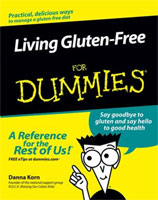Frank Buontempo Coeliac Awareness Week Interview

Frank Buontempo Coeliac Awareness Week Interview
More than 300,000 Australians have coeliac disease and are completely unaware making it one of Australia's most under-diagnosed conditions. During Coeliac Awareness Week (13th to 20th March) it is vital to raise awareness of coeliac disease and its symptoms and encourage anyone who thinks they may be suffering to get tested.
'Coeliac disease can affect both adults and children with some developing symptoms early in life and others much later into adulthood," explained Nathan Alfrey, Orgran Health & Nutrition. 'According to data from Coeliac Australia, the average time it takes for someone to be correctly diagnosed is three or more years resulting in much pain and discomfort. This means it is vital to familiarise yourself with the common symptoms and if you are experiencing any of these, get tested immediately."
The immune system of those with coeliac disease reacts abnormally to gluten (found in wheat, barley, rye and oats) where it mistakes substances found in gluten as a threat to the body and attacks them. This causes damage to the surface of the small bowel (intestine) and disrupts the body's ability to absorb nutrients from food which in turn can lead to vitamin and mineral deficiencies.
Coeliac disease can lead to a number of other disorders including infertility, osteoporosis, neurological disorders and a higher risk of other autoimmune conditions. It is also genetic and you must be born with the genetic predisposition to develop the disease. It is estimated that up to one fifth of coeliac patients have an immediate family member that also suffers from the disease and a diagnosis often leads to the diagnosis of a close family member.
Here, we outline some of the common symptoms of coeliac disease;
Diarrhoea or constipation
Bloating and flatulence
Abdominal pain
Weight loss
Fatigue, weakness and lethargy
Nausea and vomiting
A Correct Diagnosis
The symptoms of coeliac disease closely mimic the symptoms of other conditions which makes a diagnosis difficult. A correct diagnosis can only be made by showing that the lining of the bowel has been damaged which is done via a biopsy of the small intestine. A biopsy should always be carried out before starting a gluten free diet. Trialling a gluten free diet does not provide a diagnosis and investigations while on a gluten free diet will not be effective.
A Gluten Free Diet
'A strict, lifelong gluten free diet is currently the only recognised medical treatment for coeliac disease," added Alfrey. 'By removing the cause of the disease, a gluten free diet allows the lining of the small bowel to heal and the symptoms to resolve. Health issues arising from the disease should not return so long as a gluten free diet is adhered to."
Specialising in natural, gluten free products for better health and wellbeing, Orgran Health & Nutrition is a pioneer and trusted brand for coeliacs and other allergy sufferers. Over the past thirty years, the Orgran range has grown to be the biggest in Australia. The range includes alternative grain pasta, baking mixes, crispibreads, biscuits and breakfast cereals. With a selection of more than 80 products and exporting to 55 countries worldwide, Orgran offers a variety of natural foods for the whole family.
For more information on coeliac disease and gluten free products available, visit www.orgran.com
Interview with Frank Buontempo, Organ Health & Nutrition
Question: How are Australians are suffering from coeliac disease undiagnosed?
Frank Buontempo: 300,000 Australian's are unaware they have coeliac disease, making it one of Australia's most under-diagnosed conditions.
Question: What are the main signs and symptoms of coeliac disease?
Frank Buontempo: The most common symptoms of coeliac disease are:
Diarrhoea or constipation
Bloating and flatulence
Abdominal pain
Weight loss
Fatigue, weakness and lethargy
Nausea and vomiting
Question: How is coeliac disease diagnosed?
Frank Buontempo: The symptoms of coeliac disease closely mimic the symptoms of other conditions which makes a diagnosis difficult. A correct diagnosis can only be made by showing that the lining of the bowel has been damaged which is done via a biopsy of the small intestine. A biopsy should always be carried out before starting a gluten free diet. Trialling a gluten free diet does not provide a diagnosis and investigations while on a gluten free diet will not be effective.
Question: Can coeliac disease be developed as an adult?
Frank Buontempo: You can develop coeliac disease at any stage.
Question: Can coeliac disease be treated?
Frank Buontempo: A strict, lifelong gluten free diet is currently the only recognised medical treatment for coeliac disease. By removing the cause of the disease, a gluten free diet allows the lining of the small bowel to heal and the symptoms to resolve.
Question: What foods contain a high source of gluten?
Frank Buontempo: Gluten is most commonly found in wheat, rye, barely and any foods made with these grains. Gluten does however hide in many foods that you wouldn't expect for example:
seasoned chips and other seasoned snack foods
salad dressings
soy sauce
fried foods
some lunch meats
Question: Is coeliac disease hereditary?
Frank Buontempo: Coeliac disease is genetic; you are born with a genetic predisposition to develop the disease.
Question: What substitutes is there to gluten?
Frank Buontempo: Many foods are now made to be gluten free, simply made with alternative grains that do not contain gluten. Orgran includes alternative grain pasta, baking mixes, crispbreads, biscuits and breakfast cereals.
Interview by Brooke Hunter
Have You Seen This?
MORE












